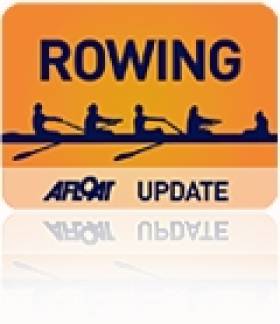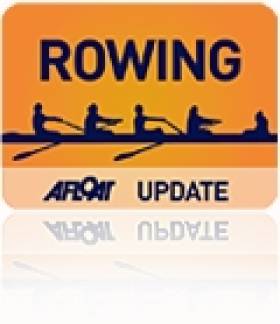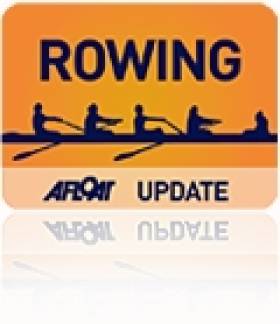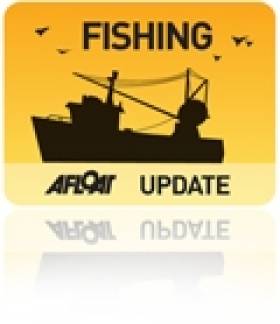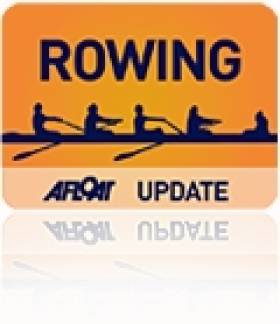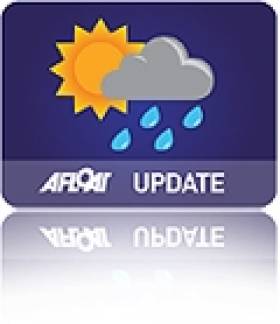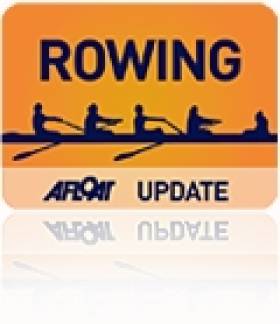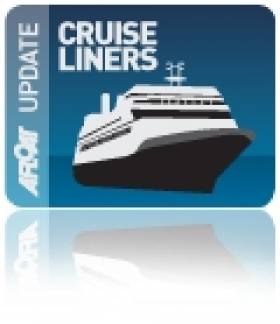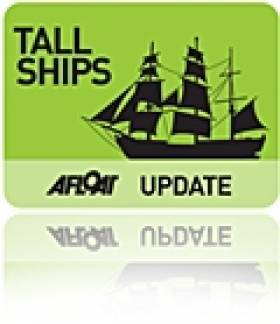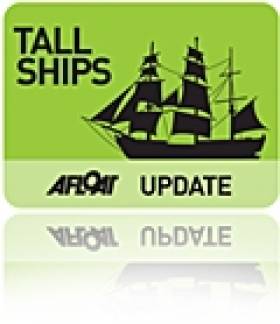Displaying items by tag: Cork
Trinity Rowers Beat NUIG/Gráinne Mhaol at Skibbereen Regatta
#ROWING: Trinity beat NUIG/Gráinne Mhaol into second to win the Division One men’s eights final in warm sunshine at the Skibbereen Regatta at the NRC in Cork today. This was a surprisingly emphatic win, with over five seconds in it at the finish.
The Division One women’s final was much closer. UCD’s eight held off repeated pushes by Trinity to win by .6 of a second.
Gráinne Mhaol had earlier won the Division One men’s fours final, while a composite with international hopes – Marie O’Neill, Aifric Keogh, Emily Tormey and Barbara O’Brien were by far the best women’s four.
The Skibbereen men’s double of Gary O’Donovan and Shane O’Driscoll had a fine win in the Division One final.
Skibbereen Regatta, National Rowing Centre, Cork (Sunday Results)
Men
Eight – Division One – A Final: 1 Trinity (A McElroy, D Butler, J Magan, P Moreau, M Corcoran, M Kelly, L Hawkes, I Hurley; cox: C Sheehan; senior) 5:55.1, 2 NUIG/Gráinne Mhaol (sen) 6:00.5, 3 Carlow (inter) 6:12.7; 4 Portora (jun 18) 6:14.6. B Final: Trinity (inter) 6:09.5.
Four – Division One – A Final: 1 Gráinne Mhaol 6:20.1, 2 Commercial 6:23.9, 3 NUIG 6:30.9.
Four, coxed – Division Two – A Final: 1 UCD (club two) 7:00.3, 2 Trinity (club two) 7:03.3, 3 Trinity B (club two) 7:05.7; 4 St Michael’s (jun 18) 7:06.4. B Final: Blackrock (club two) 7:04.6; 2 Portora (jun 16) 7:08.3. C Final: Pres, Cork 7:23.7.
Sculling, Quadruple – Division Two – A Final: 1 Commercial (jun 16) 6:45.9, 2 Clonmel (jun 18) 6:52.1, 3 Lee (club two) 6:53.5. B Final: Skibbereen (jun 18) 6:59.6. C Final: Athlunkard (jun 16) 7:21.6.
Double – A Final: 1 Skibbereen (u-23) 6:38.6, 2 UCC (sen) 6:41.6, 3 Shannon (jun 18) 6:55. B Final: Shannon (sen) 6:55.4; 2 Garda (inter) 6:59.2. C Final: Garda (club one) 7:16.7.
Single – Division Two – A Final: 1 Clonmel (S Channon; jun 18) 7:41.4, 2 Belfast BC (A Murray; club two) 7:46.7, 3 Lee (D Synott; jun 18) 7:49.7; 4 Shandon (S O’Sullivan; jun 16) 7:51.1. B Final: Clonmel (S Lonergan; jun 18) 7:46.9. C Final: Carrick-on-Shannon (T McCabe; jun 16) 7:55.6.
Women
Eight – Division One – A Final: 1 UCD (C Harrison, A Crowley, S Bennett, R Larsen, O Finnegan, G Collins, A Gilligan, R Gilligan; Cox: A O’Leary; inter) 6:41.2, 2 Trinity (sen) 6:41.8, 3 Cork (sen) 6:56.0; 5 Portora (jun 18) 7:09.4. B Final: Trinity (u-23) 7:13.1.
Four – Division One – A Final: Univ of Limerick, Cork, Gráinne Mhaol, NUIG (sen) 6:59, 2 UCD (u-23) 7:16.6, 3 Skibbereen (sen) 7:24.9; 4 Skibbereen (jun) 7:28.5. B Final: Muckross (jun 18) 7:35.6.
Four, coxed – Division Two – A Final: 1 Commercial (club two) 7:50.7, 2 Garda (club two) 8:07.7, 3 Trinity A (club two) 8:37.1; 4 Muckross (jun 16) 8:37.4.
Sculling
Double – Division One: 1 Skibbereen (sen) 7:33.4, 2 UCC A (inter) 7:42.5, 3 Commercial (jun 18) 7:44.7; 5 Belfast BC (club one) 8:07.4. B Final: Killorglin (inter) 8:03.4.
Single – Division Two – A Final: 1 Belfast BC (K Turner; club two) 8:25, 2 UCC (D O’Sullivan; club two) 8:29.8, 3 Belfast BC (S Quinn; club two) 8:31.1; 4 Lee (E Cummins; jun 16) 8:39.0, 5 Muckross (Z Hyde; jun 18) 8:42.9. B Final: Lee (C Synott; jun 16) 8:38.9. C Final: Lee (S O’Mahoney; jun 16) 8:57.2.
Rowers Revel In Calm Conditions as Cork Head Beats Weather
#Rowing: Over 200 crews competed in good conditions at the Cork Head of the River at the Marina today. The fastest crew on the day were Cork Boat Club’s senior eight, with a good time of 12 minutes and four seconds in the first of the heads. “Conditions were perfect, flat calm all day,” said Susan Dunlea, the event secretary. The head became the first and only head of the season so far to beat the weather.
Cork Head of the River (Selected Results):
Head One: 1 Cork BC senior eight 12 minutes 4 seconds, 2 Presentation College, Cork junior 18 eight 12:33, 3 Cork BC jun 16 eight 12:59; 4 Muckross intermediate eight 13:47, 5 Shandon novice eight 14:03, 6 Shandon junior 16 eight 14:18
Women, Sculling, Quadruple: Intermediate One: Killorglin 15:16; Novice, coxed: St Michael’s 17:01.
Head Two: 1 Shandon jun 18 single scull (Hennessy) 14:21, 2 Lee jun 18 single (Kearney) 14:40, 3 Fermoy senior single (Daumann) 14:42. Inter One Single: Lee RC (Buckley) 14:46; Novice single: Lee (O’Sullivan) 15:07; Junior 16 single: Shandon (O’Sullivan) 14:58
Women – Junior 18 Pair: Cork 15:13.
Head Three: Presentation jun 18 four 12:44, 2 Shandon nov four, coxed 13:42, 3 Killorglin inter four, coxed 13:59, 4 Presentation jun 16 four, coxed 14:32
Women – Double, Senior: Killorglin 15:18; Inter One: Cork 14:30; Novice: Lee 15:15; Jun 18A: Cork 14:27; 13 Jun 16: Lee 15:13.
Head Four: 1 Shandon jun 18A quad 12:14; 2 Cork jun 18A quad 12:34; 3 Cork jun 16 quad, coxed 13:23
Women – Eight, Inter One: Cork BC 15:14; Jun 18A: Shandon 14:43; Jun 16: Cork 14:53;
Head Five: 1 Lee Inter One Pair 13:43, 2 Shandon Jun 18 Pair 14:28, 3 Presentation Jun 18 Pair 14:36
Women – Sculling, Single – Senior: Cork (O’Neill) 14:49; Novice: Lee Valley (Godsil) 16:37; Jun 18A: Cork (Beechinor) 15:51; Jun 16: Lee (Cummins) 15:56
Head Six: 1 Cork BC Jun 18A Double Scull 13:37, 2 Fermoy Jun 16 Double Sculls 14:18, 3 Killorglin Jun 16 double 14:23. Inter Double: Lee 14:31; Novice double: Clonmel 15:40
Women, Four – Junior 18A: Shandon 15:28.
Rolling Head: Men, Eight – Intermediate: Muckross 13:16; Junior 15: Cork 13:52
Four – Intermediate, coxed: Killorglin 13:59; Jun 18A: Muckross 14:29
Sculling, Quadruple – Junior 18A: Athlunkard 14:11; Jun 16, coxed: St Michael’s 15:28.
Double – Jun 18A: Presentation 15:13; Jun 16: St Brendan’s 16:44;
Single, Junior 16: St Michael’s 16:01; Masters: Cork (Regan) 16:01.
Women – Four, Junior 18: Muckross 14:58.
Quadruple, Junior 16, coxed: Shandon 15:53; Jun 15, coxed: Lee 15:15
Double, Inter One: Fermoy 15:47; Novice: Clonmel 17:34; Jun 16: St Michael’s 17:16
Single, Inter One: Fermoy (Bounane) 17:04; Jun 16: Fermoy (Cotter) 16:51; Jun 15: Lee (Brozio) 16:55
Cork Head of the River Stands Alone as Lagan Event Falls
#ROWING: Lagan Scullers’ Head of the River, scheduled for Saturday in Belfast, has been cancelled. “The forecast was bad and getting worse,” said race director Gordon Reid this afternoon. The weather system could have made the course dangerous. Cork Head, however, is set to go ahead at the Marina on Saturday, with an entry of 280 crews. The high water levels on the Corrib have led to the early cancellation of Galway Head, which was set for St Patrick’s weekend.
Spanish Fisherman Fined for Illegal Fishing Activity
#fishing – Following a conviction at Cork Circuit Court, today, Friday 28th February, the Master of a Spanish fishing vessel was fined a total of €2,500 and forfeited €80,000, being the assessed value of his catch and a further €12,500 for the fishing gear onboard. Jesus Ramon Rea Rosales, Master of the fishing vessel Armaven Dos, pleaded guilty to the under-recording of monkfish in the vessel's EU logbook. The case arose during the course of a routine inspection of the Armaven Dos on the 5th August 2013, at Castletownbere, Co Cork, by Sea-Fisheries Protection Officers of the Sea-Fisheries Protection Authority (SFPA).
Sea-Fisheries Protection Officers inspected the vessel's onboard catch and when compared to its fishing logbook they discovered approximately 13 tonnes of monkfish retained onboard of which almost seven tonnes were unrecorded. In addition to the under-recording of monkfish, a substantial quantity of Megrim was also found to be unrecorded. The under-recording of catch is contrary to European Community Regulations as fishermen are required to keep an accurate record in the vessel's logbook of the fish they have onboard so that the catch limits and quotas imposed to protect these fish stocks are respected.
Susan Steele, Chair of the SFPA welcomed the outcome of the case and said: ""It is essential that all fishermen play their part in the rebuilding of damaged fish stocks such as monkfish if fishing is to be sustainable and profitable into the future. The requirement for fishermen to accurately record their catches and to keep within quota limits is a cornerstone of measures to rebuild damaged fish stocks and to share the burden of this stock recovery fairly among fishermen. The SFPA's inspection programme is intended to detect illegally caught fish and to protect the livelihoods of the many fishermen who respect the rules in place that safeguard the sustainable exploitation of valuable fish stocks. Stock recovery is good news for fishermen and ultimately leads to better fishing possibilities for the sector as well as improved market supply for consumers."
Lagan Head Off But Cork Head May Go Ahead
#ROWING: The Lagan Head of the River Races, scheduled for this Saturday, have been cancelled. The organisers, Belfast Boat Club, say that the safety and wellbeing of competitors and organisers was their primary focus. Because of a combination of increased flow on the river, and the forecast wind speed, wind direction, and temperature they would be unable to guarantee the safe marshalling of crews for a head of the river race. They made the decision in order that crews can make other arrangements for the weekend.
However, the organisers of Cork Head of the River, which is also set for Saturday, hope to hold the event. Any decision on cancellation will be announced tomorrow (Friday).
Cork In Recovery After Flood Waters Reach 'Waist Height'
#Flood - Just days after Limerick experienced its worst flooding in recent memory, Cork city last night was deluged by a high tide that saw waters reportedly rise to waist height on lower lying streets.
As RTÉ News reports, Cork Lord Mayor Catherine Clancy has called for the speeding-up of plans for new flood defences following what she described as a "red-alert" situation for the city, the centre of which lies on an island surrounded by the River Lee.
Businesses and residents in the city centre were this morning in recovery mode after two nights of flooding that have caused thousands of euro worth of damage, according to The Irish Times, though council-issued gel bags helped avoid an even worse disaster.
Mitchell Fastest at Cork Sculling Ladder Time Trial
#CorkScullingLadder: John Mitchell of Lee Rowing Club was the fastest man at the Cork Sculling Ladder time trial at the Marina today. Dan Buckley of Lee and Eamon Joyce of Cork Boat Club were locked on the same time in a tie for second, just two seconds behind Mitchell. One place further back, three men tied for fourth: Dan Begley of Shandon, David Synnott of Lee and Colm Hennessey of Shandon. Marie O’Neill of Cork BC, who won last year, was also the fastest woman this time.
Cork Sculling Ladder TT, Marina, Cork (Selected Results) Men: 1 J Mitchell (Lee RC) 7:08, 2= D Buckley (Lee), E Joyce (Cork BC) 7:10; 4= D Begley (Shandon), D Synnott (Lee), C Hennessey (Shandon) 7:20. Women: M O’Neill (Cork BC) 7:53.
Cruise Liners Bring €40m to Cork Economy Each Year
#CruiseLiners - Cruise liner visits are worth more than €40 million annually to the Cork economy, it has emerged.
According to TheCorkNews.ie, the economic boost comes with a 50% in cruise visitor numbers last year, with 88,000 passengers coming to the city on 57 liners.
"Figures from the Port of Cork suggest that cruise liner passengers contribute €40.9 million and 197 full time equivalent jobs to the regional economy." said Jerry Buttimer, Fine Gael TD for Cork South Central.
Buttimer also commented that while the cruise industry "is not a lucrative source of revenue for port companies themselves, it provides considerable benefit for the local and wider regional economy."
By the end of this month alone, the Port of Cork is expected to have welcomed 21 cruise liners carrying up to 30,000 passengers, towards a projected total of more than 60 for the 2013 season.
And expansion of this cruise business west of Cork Harbour is also on the minds of Cork County Council, with Bantry Bay being groomed as a destination for the new generation of luxury ships.
TheCorkNews.ie has more on the story HERE.
Thieves Raid Astrid Wreck Under Cover Of Darkness
#Astrid - The ship's bell and compass are among the items stolen in a dastardly raid on the wreck of the tall ship Astrid near Kinsale, as The Irish Times reports.
Owner of the near-century-old brig Pieter De Kam said that while he is "eternally grateful to the Irish people" for the rescue of all 30 crew on board when the ship struck rocks last Wednesday (24 July), he is "not grateful to whatever Irish people have gone aboard my ship and stolen my compass, my bell and my binnacle".
Breaking the exclusion zone set up around the tall ship - which went down after striking rocks and taking on water in strong winds and heavy seas while taking part in The Gathering Cruise - it appears the thieves slipped in by nightfall at low tide last Friday night (26 July) to grab their ill-gotten loot.
Though the 42-metre sail training vessel remains mostly intact, despite her ordeal, in the water near the Sovereign Islands off Ballymacus Point, it is unlikely that she will sail again due to the severity of damage to her hull.
Four RNLI Lifeboats Rescue Crew From Sunken Tall Ship Astrid
#TallShips - Four RNLI lifeboats were involved in the rescue of 30 crew from the tall ship Astrid, which sank off the Cork coast earlier today (Wednesday 24 July).
The 42m Dutch training vessel reportedly hit rocks inside the Sovereign Islands at Ballymacus Point, near Kinsale.
All on board were brought to safety when the Kinsale lifeboat transferred the casualties from the sinking ship onto the Courtmacsherry RNLI lifeboat and a local vessel. They were then taken to Kinsale.
Both Kinsale and Courtmacsherry RNLI lifeboats were called out at 12 noon today to go to the immediate aid of the sail training vessel that had got into difficulties on the western entrance to Kinsale Harbour in Cork.
Ballycotton and Crosshaven RNLI were also launched, though the Kinsale RNLI lifeboat was first on scene. There was a 2m swell and winds were force five to six.
The training vessel had lost power and was apparently driven on to rocks by a strong southerly wind at the western entrance to Kinsale Harbour. The grounded vessel was taking on water and a crewmember from Kinsale RNLI was put onboard.
Eighteen of the casualties were taken off the Astrid by Kinsale RNLI lifeboat and transferred to Courtmacsherry lifeboa, before being brought to safety. The remaining 12 were put onto a liferaft deployed by the Astrid’s crew, which was towed to safety by the Kinsale lifeboat and picked up by a local vessel.
The people on board the liferaft were then taken to Kinsale harbour and assessed by medical teams.
Irish Coast Guard helicopters from Waterford and Shannon were also on scene along with ambulances and medical crews from Cork.
Speaking about the call-out, Courtmacsherry RNLI coxswain Sean O’Farrell said: “Everyone was very fortunate. I want to praise the quick thinking of the skipper and the crew from the Astrid. They kept calm and did everything we asked them to do. We were able to get them to safety quickly and a major tragedy was averted. To be able to recover 30 people safely was a great day for everyone involved.”
Meanwhile, the Irish Sailing Association has issued the following media statement on behalf of the tall ship Astrid:
Tall Ship Astrid was on a voyage from Southampton to Cherbourg calling in to Kinsale. On board were 23 trainees from France, Ireland, the Netherlands, UK and Spain. The crew were from Belgium and the captain, Pieter de Kam was from the Netherlands.
As the Astrid was leaving Oysterhaven, as part of The Gathering Cruise parade of sail to Kinsale, the vessel experienced engine failure. They notified a nearby RIB which was being helmed by Irish Sailing Association (ISA) CEO Harry Hermon.
The RIB attempted to take a line from Astrid. However, due to the onshore winds and swell this was not possible. Captain de Kam issued a May Day.
The ISA RIB and the yachts in The Gathering Cruise flotilla stood by until the RNLI arrived. There was a safe rescue of all 30 crew who were brought to Kinsale on board the yacht Spirit of Oysterhaven and the lifeboat. All crew were brought to Kinsale Yacht Club where they were provided with showers, food and dry clothing. They were all medically checked and are in good health.
Sail Training Ireland and Kinsale Yacht Club are working together to make arrangements for accommodation and for returning the crew to their homes.
Commenting on the rescue, Captain Pieter de Kam of the Tall Ship Astrid stated: “I would like to thank the lifeboat and the coastguard for the safe rescue of all my crew. We very much appreciate their outstanding work.”
Harry Hermon, CEO of the Irish Sailing Association, commented: “It is thanks to the rescue services that all crew were rescued quickly and safely without injury. I would also like to thank all the sailors from the Gathering Cruise who stood by Astrid providing support to the crew.
"Kinsale Yacht Club has also been fantastic providing food and clothing and helping Sail Training Ireland find accommodation for all the crew”.


























